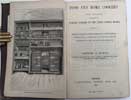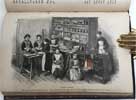FOOD AND HOME COOKERY.
NEW EDITION COMPRISING OF A COURSE OF LESSONS WITH DIRECTIONS FOR THEIR PRCTICAL CARRYING OUT IN ACCORDANCE WITH THE NEW CODE OF REGULATIONS OF THE EDUCTAION DEPARTMENT 1882 BY CATHERINE M. BUCKTON MEMBER OF THE LEEDS SCHOOL BOARD: AUTHOR OF 'HEALTH OF THE HOUSE' AND 'TOWN AND WINDOW GARDENING' LONDON LONGMANS, GREEN, AND CO. All rights reserved
120 x 178 x 12 mm. 1fep. [1] verso with Frontis of illustration of Kitchen. Title Page. verso 'Opinions of the Press'. (1)iv - vi Preface. (1)viii A Tabulation. ix - xliv Directions. (2) Contents and Illustrations. (1)xlviii Preface. (1)2 - 102. (1)104 - 108 Index. 1fep. On front inside cover; Birmingham school Board prize label. Publishers black cloth. Blind stamp title to the front board. Gilt title on the spine. Text block very clean with 14 illustrations.
- This is a very interesting book, because it sets out a very comprehensive set of cookery and hygiene lessons with sound practical domestic advice. Even with the duties of a Nurse and the diet of a nursery tackled. Also included, a fascinating history of how edible torulea yeast was discovered and used. A look at the index gives a great insight into a completely different age for women. Since the advent of mass food productions, supermarkets etc, this is less of a cookery book and more of highly pragmatic domestic history book. In researching this book and the author I came across online, this article from the Thoresby Historical Society founded in 1889. I wanted to try to reduce it somewhat, but after reading it, I decided to reprint the whole article as a small homage to Catherine Buckton. -- "In 1870 the ground-breaking Elementary Education Act gave all children the right to education up to age thirteen. School Boards were set up in all the major cities with the urgent task of providing places for all the children who had never had regular schooling – some twenty thousand in Leeds alone. Elections were held for membership of the Board, and for the first time women were allowed to stand for public office. There was bitter competition in Leeds for the fifteen seats, split by religious, political and class loyalties. Two women boldly entered the fray as Liberal candidates. Neither won a place, but for Catherine Mary Buckton it was the start of her long fight for educational opportunity and child welfare. She was the wife of Joseph Buckton, a prosperous Leeds wool and cloth merchant, living in a comfortable house overlooking Woodhouse Moor. Brought up in London and Wales, the daughter of a doctor, part of a large lively family with distinguished connections in science, philosophy and politics, she was well aware of the desperate living conditions and high death rates of the great industrial cities like Leeds and the urgent need for public health reform. She was already an active member of the Ladies’ Council of the Yorkshire Board of Education, so she was well-informed and at this stage of her life, in her forties with her two children nearly grown-up, she was ready for a challenge. She believed a key approach was through the education of girls, the wives and mothers of the future. Determined to stand again for the Board at the next election in 1873, she agreed meanwhile to run a series of evening courses for working women in Holbeck and Wortley on health, food and hygiene. Knowing most of her audience would be illiterate, she created simple diagrams and experiments to illustrate her points. Her talks proved very popular, not least because of her understanding and empathy with her listeners. She heard many disturbing tales of the superstitions and ignorance which contributed to infant deaths, and she gained insight into the terrible, demoralising conditions many working women lived in. She was encouraged to publish an account of her ‘painful but delightful’ experience, the first step in what was to become a highly successful writing career. In 1873 she won election to the Board, and was to remain the only woman member until her retirement in 1882, on occasion topping the poll. She proved a combative and articulate campaigner for girls to be taught cookery and the principles of health and hygiene, and went round schools herself to give practical lessons and demonstrations. She designed a special cupboard with all the equipment needed for cookery lessons in the schoolroom and helped to set up training schemes for teachers. Through her work Leeds won a national reputation as a leader in health education. Meanwhile she continued to write and publish, promoting her ideas. Her books ‘Health in the House’, ‘Food and Home Cookery’ and ‘Our Dwellings, Healthy and Unhealthy’, fully illustrated and clearly written, were widely read across the country, not only by women, and reprinted many times. Her love of nature and concern for the many Leeds children who had no access to gardens led her to institute an annual School Board competition for children to plant and exhibit window boxes, with hundreds of children taking part each year. Her book on this subject, ‘Town and Window Gardening’ (1879) was another popular success, and contributed to her national reputation, winning praise from Prime Minister Gladstone himself. A strong Unitarian, she remained throughout her time on the School Board a supporter of free secular education and religious freedom. Sensitive to the needs and problems of the poor, she was a vociferous fighter on their part in various battles. When she retired in 1882 she published a review of the Board’s work, with a powerful critique of penny-pinching attitudes to education. She believed in the need to provide a sound education for all children, whatever the cost – taxes should be spent on that, she declared, rather than ‘wicked, senseless wars’. She retired to London with her family and published one further book ‘Comfort and Cleanliness’ in 1894. She remained a strong believer in women’s rights and a keen advocate for women’s suffrage and equal work opportunities. She died in 1904, and a scholarship in her name was founded by her sister at Abadare Hall for women in Cardiff. Her work still resonates today, with its stress on healthy eating, good childcare, and the need to enjoy and protect the natural world". -- Even though this book will never find its place as a valued item on the shelves of a good cookery book collection, it should find a much more comfortable place in any collection of great people and unsung heroes. Remarkable.!






click on image to enlarge

Antiquarian category
ref number:
11248